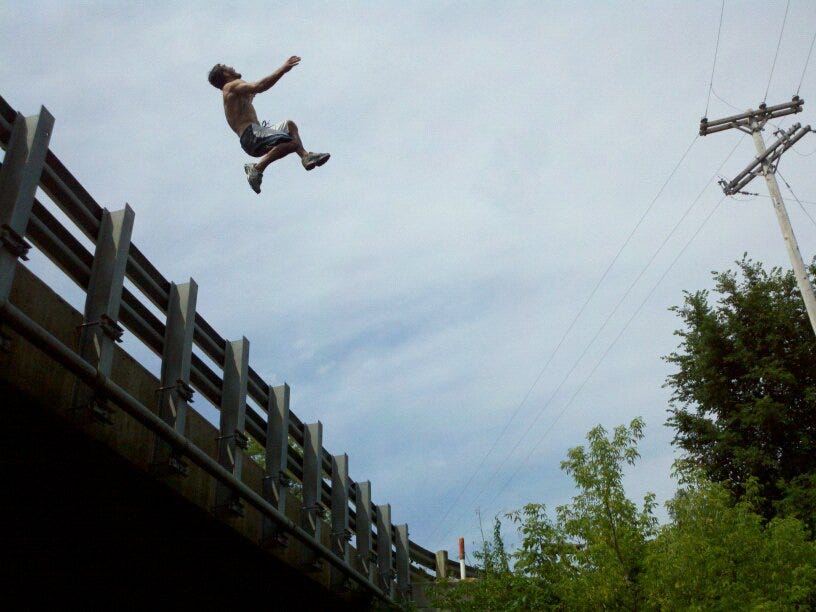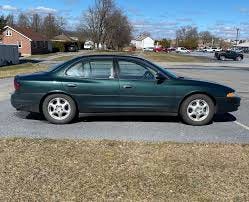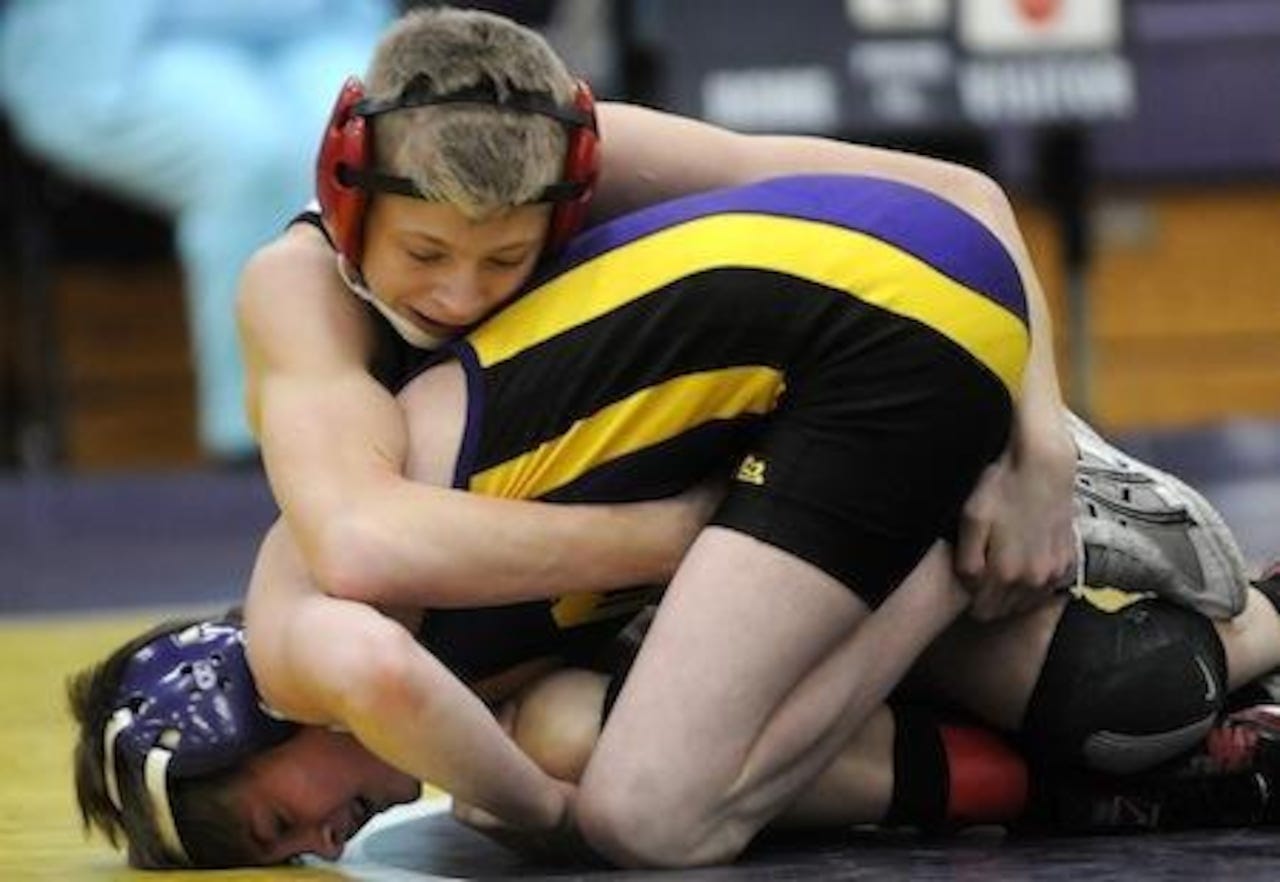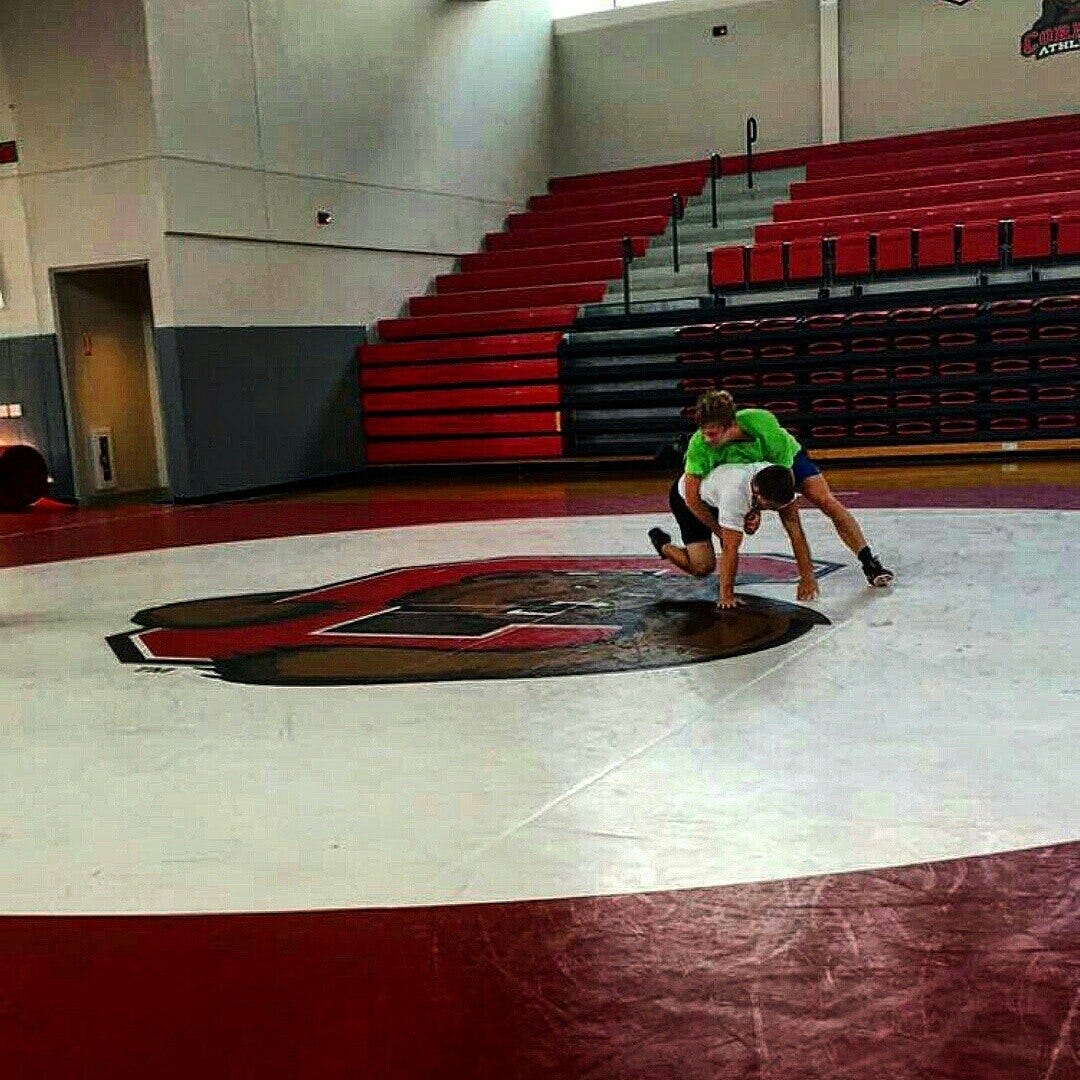The Purpose Trap
When not failing feels safer than living: classed purpose, social capital, and a wrestler’s education in risk, resilience, and meaning.
The guidance office smelled like dry-erase marker, stale Folgers, and carpet shampoo. Mrs. Parsons slid a worksheet across the desk, INTERESTS → CAREERS, in a diagram that resembled a bingo card. “Purpose,” she said, tapping the empty box at the bottom. From outside her office, I heard the janitor’s radio playing an ad for a regional tax company. I checked the clock, racked my brain for something that seemed worthy, and said, “I like to make people feel better,” which felt like picking D) All of the above.
At some point in life, we are all told to “find purpose.” The directive comes at us as gentle suggestions from guidance counselors with questionable1 smiles and posters of kittens hanging from tree branches. Then manifests as increasingly urgent demands from parents who’ve begun calculating the cost-benefit ratio of your existence, and finally as an imperative through commencement speeches and Instagram captions. If you don’t have purpose, you should seek it. If you have it, you should refine it. Then expand it. Then monetize it, optimize it, and update your LinkedIn profile to reflect it.
But purpose is not a direction, it’s not a horizon, it’s a classed tunnel—one we choose when not-failing feels safer than living.
The Means-Tested Luxury
What’s particularly cruel is the way purpose-as-salvation is advertised differently depending on which socioeconomic lottery ticket you were granted at birth. For the privileged minority, you know who they are, purpose is a buffet of experiences to be sampled between semesters abroad or unpaid internships at their father’s law partner’s brother-in-law’s hedge fund.
Alan Watts preached that it’s “better to have a short life that is full of what you like doing, than a long life, spent in a miserable way.” Today, this wisdom has become a luxury good, accessible primarily to those with trust funds or family connections.2 Some digital platforms promised democratization: TikTok, Twitter/X, Instagram, but for most, these platforms are a lottery.3 A tiny slice of creators catch a flare of attention without the security or slow-build substance a Hemingway or a Joni once scraped together—back when dedication could still pay for a studio in a real city. Watts’ counsel now functions as a means-tested luxury. You can follow that advice if failure doesn’t evict you.
The 1980s “starving artist” would, in 2025, be priced out. Art itself is a plaything or investment strategy for the wealthy or a desperate survival hustle for those willing to exile themselves to the last affordable corners of Detroit, Cincinnati, or San Antonio, urban utopias where dedication to craft has outpaced landlords’ demands for a few seasons. (Full disclosure: I’m a landlord; I know which way the wind blows.)
I don’t hold grudges against those who choose to make art with their runway. Means plus patience is a dream we all pursue. What I can’t get behind is the legacy banker white-knuckling a job he hates, occupying a spot a first-gen striver is grinding for, so maybe their kid might get the luxury to choose. Instead, these first-gens have to play the long game of wasting away before they can find themselves on a level playing field with a prodigy new grad.
For these privileged archetypes, purpose is paradoxically to enjoy purposelessness for as long as possible, to drift through the extended adolescence of elite education while accumulating the kind of social capital that can’t be taught but is worth far more than whatever is being lectured about in PHIL 39154. For them, purpose isn’t a burden but a costume they can try on and discard at will; the ultimate luxury in a culture obsessed with productivity and direction.
The Emergency Evacuation Plan
For the rest of us—the middle and working-class masses, the scholarship-scroungers, and financial-aid-form-fillers—purpose is less a journey of self-discovery and more an emergency evacuation plan. We’re not told to “find what makes your soul sing” so much as “find something that won’t leave you worse off than your parents.” When career advisors talk to us about “passion,” it comes with asterisks, footnotes, and pragmatic caveats. Oh, you want to be a painter? How comfortable are you with eating sleep for dinner? An actor? Hope you enjoy watching your credit score plummet faster than a liberal arts major’s job prospects while you wait tables for the very same rich teens who could snag the role you’re auditioning for if their father has even the slightest connection to the producer.
Purpose, in this context, is tunnel vision we willingly impose upon ourselves—a narrowing of possibilities sold as virtue. So long as that constricted path leads to the potential of not declining in socioeconomic status, we convince ourselves that it’s worth throwing away youthful passion in pursuit of something we aren’t entirely sure we want.
Before Purpose Found Me
Before Ithaca, I didn’t have a name for any of this.5 Purpose belonged to other people—classmates who mapped their lives out in college essays and SAT prep courses. If I had purpose, I couldn’t name it. I was a typical midwestern kid who did things by the seat of my pants. Not in a way all too different than most of the Northeast private school kids I would later hold silent resentment for. Except when they screwed up, it didn’t matter. When we did, it left scars. We didn’t pray to the same gods as the 1%. We didn’t have Ivy League dreams.
We drifted our $900 cars, vehicles purchased with summer job earnings from baling hay or manning the fry station at Bagger Dave’s, down crushed gravel dirt roads until we slammed into trees with four of our best friends in the back seat, the collision buffered by the invincibility that comes with having a still-developing prefrontal cortex and no meaningful concept of mortality—with very little to lose we feared boredom more than death.
Said cars are uniquely midwestern artifacts, typically a ‘94–’986 domestic sedan or truck, likely including mismatched body panels from previous repairs, and a surprisingly functional sound system accounting for a disproportionate percentage of the vehicle’s total value. Mine was a hand-me-down after my grandmother died, a green Oldsmobile Intrigue, with an Alpine sound system installed within 7 days of ownership.
We jumped off sketchy bridges, abandoned railroad trestles, and tied ropes to any tree on a slope leading to a body of water. Somehow, going airborne before landing in icy water made any pain we endured worth it. Every spring, I waited for that opening day. In Michigan, 60° isn’t a temperature; it’s a switch—thaw air, first rain, and suddenly everyone behaves like we’ve been air-dropped into Gulf Shores.
With snow gone, snowmobiles changed to four-wheelers, often leading to separated shoulders, concussions, and open wounds. The crackling of gravel under balding tires—acoustically twin to the crackling of bonfires—served as the backdrop for nearly all meaningful Michigan adolescent social interactions. These fires, it should be noted, annually result in at least one mild burn incident involving a teen under the influence who, having failed to absorb even the most rudimentary chemistry principles, would pour gasoline onto an open flame not quite large enough for them, and then, when the fire predictably creeps up the accelerant stream, swing the can in a panicked frenzy across their friends.
I worked odd jobs: at the Ada-Lowell 5 movie theater, and for an uncle who ran assisted living facilities for adults with mental disorders. For my uncle, I grabbed groceries, fixed toilets and door handles, mowed lawns, and occasionally played basketball games with the residents in the muggy summer afternoons of West Michigan. One resident, Steve, had extreme savant autism, which blew my 17-year-old mind. His specific savantism was reciting the score of any hockey or baseball game going back some 30 years. He’d sit on the porch and I’d test him: “Game 2, 1997 Stanley Cup Finals.” Instant: “Red Wings 4, Flyers 2, Shanahan, Yzerman and Maltby scored for Detroit, Rod Brind’Amour scored both goals for the Flyers.” Every time, perfect. He was a walking AI algorithm before everyone had an LLM in their pocket.
I had friends who drove drunk into dentist offices, I had friends who “accidentally” took whole bottles of Adderall and stayed up for 7 days straight, who rolled their rusted-out GM variants into drainage ditches or cornfields. Surprisingly, nearly all emerged unscathed. I felt pulled to do anything entertaining, often the riskier the better. The chaos was self-created, purposeless, and pure, often creating a better sense of purpose than any seeking I have ever done. At seventeen, purpose was a concept for other people—people who took the time to wonder what would happen if the water under the bridge wasn’t deep enough.
I had no desire for purpose, and was frustrated at my classmates who had something they were striving for. Deep down, that was admiration, which never surfaced as jealousy but instead stuck in my head as motivation to try and do it all: be cool, get good grades, become a high-caliber athlete, find my way into a good college, and make it look easy. My adolescent brain was never organized enough for this to be a conscious strategy—I was flying by the seat of my pants, living without a task list, defined by a kind of reactive chaos.
And while that purposeless energy defined my high school years, one specific experience began to violently reshape it.
The Wrestling Room
The summer I went to Ithaca, New York, to train wrestling, things began to change. I walked into the Friedman Wrestling Center and was immediately enveloped with a familiar calming scent, of a gym, but not the sanitary arena or basketball court gym, something more specific, warmth, humidity, a mixture of salty sweat with a hint of bleach and cedar wood, depending if the sauna was in use—it nearly always was. The red glow of the mats created peace and a tinge of anxiety due to anticipation of what was to come. For me that was exactly what I needed. Hope, practice, growth, the process of realization, meeting my potential, a once in a lifetime opportunity. That summer I saw something I had never seen before: people who wanted something so badly it was written into their bones. I wanted to be one of them. Not because I understood why yet, but because they did.
Wrestling is wild, beautifully unpredictable chaos, but I had a strange instinct for it and a deeply competitive nature that often led to competitive matches even against those who were technically superior to me—at least during my formative years of high school between ages 15 and 18. Wrestling was pure, and it benefited me because I wasn’t a logical thinker or a technician, just instinctual.
Many people compare wrestling to chess, but in my opinion, it is a bit more like tennis. A wrestler, at their best, is not all that cerebral. For the tenured veteran wrestler, you can tell, just by watching, when someone begins to think too much—you almost begin to feel bad for them. It’s hard to stop thinking in a match once you start, and depending on how much time is left, as a spectator, it can be relatively easy to predict a comeback. You can sense it, defeat due to overthinking.
I wasn’t logical or technique-focused, but I did practice incessantly, quitting other sports to focus on wrestling. I was hardly coachable until the last two years of high school. Being 5’6 and 105 pounds sopping wet going into my junior year meant that football—my preferred sport—became less a sport and more a study in the effects of high-speed collisions on the human skeleton. I strangely loved the feeling of getting my bell rung, but didn’t love the feeling of riding the bench while my teammates bonded over impact plays.
Wrestling is its own sport with its own rules both on the mat and off. You never starved yourself before a tennis match or a chess tournament or a football game. Wrestling is a fight, controlled chaos, with few strict rules judged and scored by flawed humans determining when, where, and whether those rules apply at all.
That summer, I became increasingly aware—something that inevitably results in heightened senses of anxiety. I became aware of wanting something that would take so much work it would scare the living shit out of me.
My academic record had been mediocre at best. In my first two years of high school, I let myself get par grades despite testing and writing well. I sat around a 3.0 GPA, plenty good enough to get into most state schools, but nowhere near the caliber to get into the schools I was aiming for.
My goal was to use wrestling to get into Cornell. I didn’t know how I would do this yet, I didn’t have excellent grades or test scores. I would later tour several schools in the hopes of wrestling for them, many smaller DIII schools, North Central was a top choice. I also toured Michigan State and some other programs, but after visiting Cornell, nothing met the expectations it had set for me.
It turned out that I could use wrestling to get my foot in the door. I knew team members, and I had their support in attempting to get accepted—something that I believe is likely the apex moment that put me on a different path, a path of attempting to realize something despite having no plan, just blind faith and utter lack of defined purpose which turns out to be quite helpful for taking the first step, but not the most supportive for figuring out the rest.
In my junior year, I placed 7th in the state, and my senior year, I placed 4th after a devastating loss in the semi-finals—a match in which I completely left my body for the first half, getting taken down with an ankle picked four times, rallying and nearly securing an impossible comeback that made the loss even more sour. My 4th-place finish did what I needed it to do: it made me eligible to train at the regional training center in Ithaca, NY. If I had one more loss, it would have been over; I wouldn’t have been considered high-caliber enough to train at the RTC, and the dream would have been done.
Purpose was about to find me whether I was ready for it or not.
Subscribe to be reminded when part 2 comes out next Sunday, 10/12
Below you can find some artifacts from that time period: One of the many bridges we used to jump off, the Oldsmobile intrigue I ended up totaling, a photo wrestling sophomore year of high school, my buddy Matt skating while working at the movie theater, a practice at Cornell the summer after graduating.
“Questionable” not in any sinister sense, but in their authenticity; smiles worn by professionals often as adrift as the students they counsel, questioning whether or not they should spend more time on the MLM Scheme they were recently recruiting into.
‘Nepotism’ the shorthand ‘nepo baby’ — is now everyday cultural vocabulary.
A lottery for the emerging, but a self-stroke for established and has-been artists to diversify and blanket feeds so algorithms can’t even push an emerging artist if they wanted. I am all for Kid Cudi and Ed Sheeran testing their hand at fine art, but taking space and airtime from true devoted emerging fine artists feels greedy.
Moral Psychology in Action; Cornell University
Hell, I could hardly read, let alone write a semi-cohesive essay
At this time in 2010






